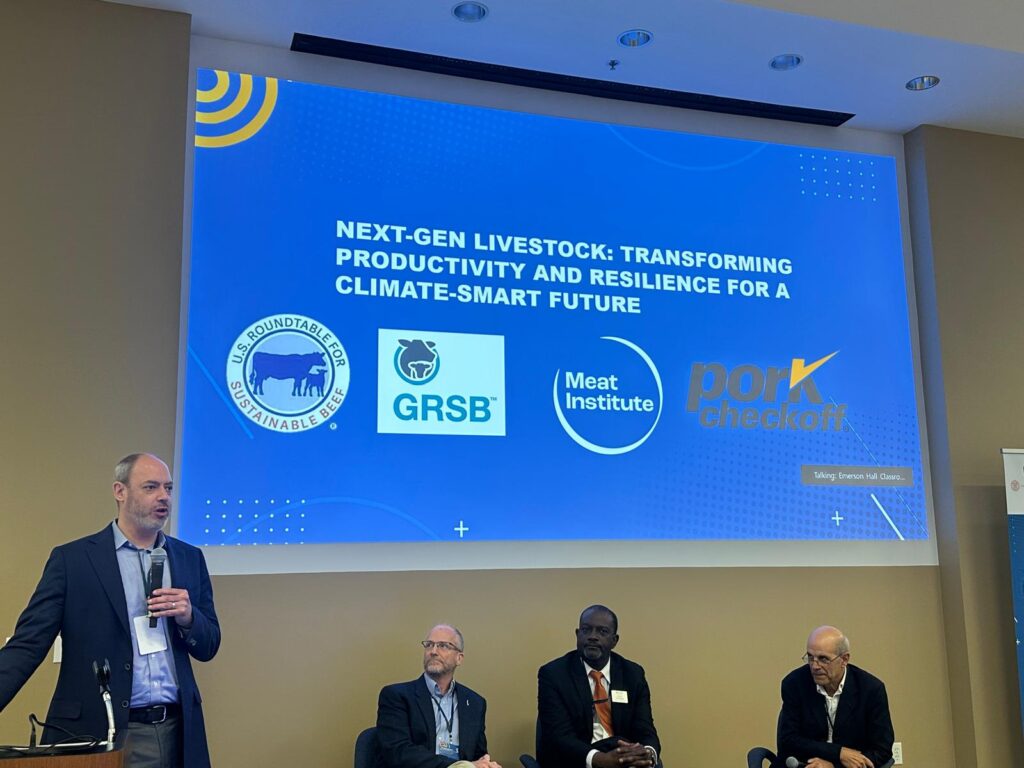
During the workshop “Advancing Agricultural Science to Deliver Societal Value in LAC and the U.S.,” held by FONTAGRO from May 13 to 15, 2025, at the University of Florida, Dr. Eric Mittenthal from the Meat Institute presented a series of key initiatives focused on sustainability and collaboration within the agri-food industry.
The Meat Institute provides organizations with the resources they need to deliver nutritious animal protein to consumers. It supports businesses processing beef, pork, lamb, veal, and poultry, as well as their supplier partners, who sustainably feed families around the world.
During his presentation, Eric emphasized the Meat Institute’s commitment to ensuring that 100% of its members report sustainability metrics by 2030. This approach aims to increase transparency and accountability within the industry, proactively addressing environmental challenges.
One of the key pillars of his speech was the implementation of animal welfare audits, highlighting that by 2025, all members that handle live animals must undergo third-party audits to ensure proper care during transport and handling.
This initiative promotes practices that ensure the welfare of animals throughout the production chain. Eric also stressed the importance of collaboration with organizations like Feeding America to measure and help close the “protein gap” in the U.S. Looking ahead to 2025, the Meat Institute aims to ensure that families in need have access to high-quality protein in accordance with dietary guidelines.
Innovation in reducing environmental impacts was another key topic in his presentation. Eric detailed how the Meat Institute is supporting all its members in decreasing their impact on the climate, land, air, and water, aligning efforts with scientific practices at a global level. This approach highlights the importance of technological innovation in achieving a more sustainable agri-food sector.
Additionally, the commitment to reducing workplace injuries by 50% by 2030 was discussed, an effort aimed at improving safety and well-being for workers in the meat industry. This commitment reflects a comprehensive approach to continuous improvement across all facets of production.
Finally, during his address, Eric explored new financing strategies that facilitate the implementation of sustainable technologies and innovative practices. This aspect underscores the relevance of collaboration between the private sector and development banks in advancing toward more responsible and efficient agriculture.
With these important interventions, the workshop reaffirms FONTAGRO’s commitment to driving innovation in the agri-food sector and its dedication to building a robust ecosystem through international collaboration.
Learn more at: https://digital.fontagro.org/en/medium-term-plan-2025-2030-en/
***
About FONTAGRO
FONTAGRO was created 1998 with the purpose of promoting the increase of the competitiveness of the agri-food sector, ensuring the sustainable management of natural resources and the reduction of poverty in the region. The objective of FONTAGRO is to establish itself as a sustainable financing mechanism for the development of agricultural technology and innovation in Latin America and the Caribbean and Spain, and to establish a forum for the discussion of priority topics of technological innovation. The member countries are: Argentina, Bolivia, Chile, Colombia, Costa Rica, Ecuador, Spain, Honduras, Nicaragua, Panama, Paraguay, Peru, Dominican Republic, Uruguay and Venezuela. In the last 27 years 204 regional agricultural innovation platforms have been co-financed for an amount of US $ 150.7 million, which has reached 531 institutions and 35 countries worldwide.
